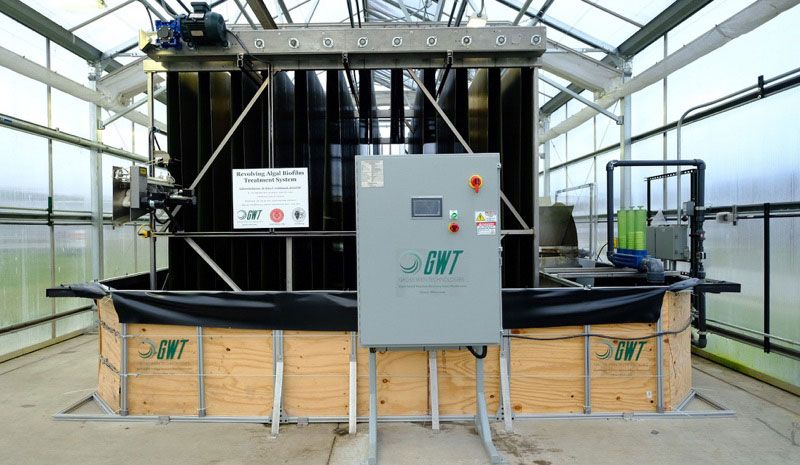Slater, Iowa, to Become the First City to Use New Algae Wastewater Treatment System
Published on by Water Network Research, Official research team of The Water Network in Technology
The central Iowa town of Slater will be the first city in the state to try a new wastewater treatment process that uses algae to remove ammonia as well as other nutrients.
By Dar Danielson

The module that holds the biofilm. (Image Source: Radio Iowa)
The technology was created not far from Slater at the Ames-based Gross-Wen Technologies. Max Gangestad is the company’s spokesperson. “It’s called the revolving ae biofilm… typical algae grows in suspended liquid, think about the algae growing in a lake, it mixes in the lake. Our system grows on what’s called a biofilm,” Gangestad says.
That biofilm is dropped into the wastewater. “It’s a rotating belt that goes down into the water and spends most of its time out of the water. So it is able to grow more algae and it’s able to grow at a lower moisture content and it just makes the efficiencies of the system a lot better,” according to Gangestad. He says the nitrogen in the wastewater is naturally removed.
“Algae is a plant so as it grows it is taking up the nitrogen and phosphorous that it needs to grow — just like corn and soybeans take up nitrogen and phosphorous when they grow — algae do the same thing,” Gangestad says. ” So, we grow algae in the water, and it takes up the nitrogen and phosphorous.” They periodically harvest the algae from the plant.
“We take the algae out of the wastewater treatment plant and we palletized it and we sell it as a slow-release fertilizer,” Gangestad says. He says his company pays the city for the algae.
Small town Iowa folks don’t want to be algae peddlers — so we will have an offtake agreement with the city and we will purchase that algae from them and we will produce the algae byproduct,” Gangestad says. Gangestad says the algae takes more of the materials out of the wastewater and makes it cleaner. The program has been in the testing stages and this agreement moves it forward.
Read the full article on Radio Iowa
Media
Taxonomy
- Wastewater Use
- Treatment
- Wastewater Phycoremediation
- Decentralized Wastewater
- Cooling Boiler & Wastewater
- Waste Water Treatments
- Algaecides
- Technology
- Wastewater Treatment
- Biological Treatment
- Wastewater Collection
- Water Treatment Solutions
- Industrial Water Treatment
- Industrial Water Reuse
- Industrial Water Managment
- Algae
- Waste Water Reclaimation
- Environment & Water
- Water sanitation
- Algae Treatment
- Water microbiology
- Waste Water Treatment
- Biofilm Sensors
- Wastewater Heat Recovery
- Moving Bed Biofilm Reactor (MBBR)